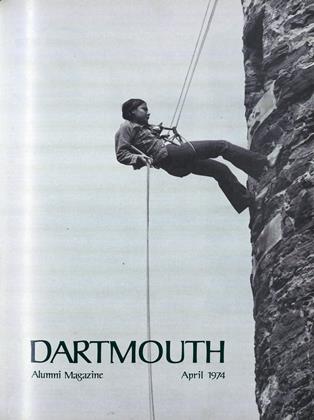By Stewan Hoagland '28. Somervile, NJ.. SomersesPress, Inc.. 1973. 19 illustrations and 3 maps146 pp. $3.50.
Written with painstaking care by a former editor of The Dartmouth, this book throws light on the Revolution as "the golden period of New Jersey history." Mr. Hoagland attempts to focus on the bravery, quick-wittedness sacrifices, and energy of New jersey men and women who, often risking and sometimes losing their lives, fought on to victory and freedom Some of the illustrations and touches of local color may generate more excitement in non-New Jerseyites than the firm and solid facts concerning birth, businesses, and deaths.
Thus William Livingston, the first govern of New Jersey, was sent as a boy of 14 to live with a missionary among the Mohawk Indians because his family looked to his possible future as a fur trader or a speculator in frontier land Martha Washington used to preside over midday meals with as many as 30 officers and other guests and over a house staff of 14, including her Own personal maid and a body servant for General George. Seven more servants worked on the home plantation, 24 on various farms, 11 at trades and 7 in the mills.
Known in the American colonies as Lord Stirling, William Alexander acted and dressed like an English earl with 31 coats, 58 vests and waistcoats, and 43 pairs of breeches. His phaeton and coach he imported from England and at dinners he entertained George Washington with imported wines and spirits His daughter, Lady Kitty, married William Duer of Washington's army, who was wealth enough to outdo his father-in-law. In his New York home liveried servents served 14 diflerent kinds of wine at dinner, a sobering thought.
Bright enough to graduate from Princeton at 16, Aaron Burr took his forthcoming duel. the result of 15 years of Hamilton's almost pathological hatred, so seriously that he practiced appropriate moves in his garden and sharpened up his marksmanship. Hamilton apparently did not, and, shot, could regret his nonchalance for only one day.
The Revolution produced a poet of Huguenot extraction, Philip Freneau, and much of his early work, published in pamphlet form. was directed against the British. The intensity of feelings - and the quality of his poetry may be deduced from this quatrain:
From an Island that bullies and hectors and swears I send up to heaven my wishes and prayers That we, disunited, may free men be still And Britain go on - to be damned if she will.
As a newspaperman Freneau joined forces with Jefferson and Madison in their conflicts with Alexander Hamilton. Jefferson praised Freneau and said that he "saved our Constitution," but Washington damned him as "that rascally Freneau."
Am Irishman of Scottish descent, John Honeyman, a spy, provided Washington with 'inortant information enabling him to win, on Christmas night 1776, the Battle of Trenton. To Bacchus to whom the British were offering Christian libations must also be given some credit. Spying and the meat business proved Profitable. The patriot-businessman bought two farms, fathered seven children, at the age of 90 joined the Presbyterian Church, and lived to be 95.
 View Full Issue
View Full Issue
More From This Issue
-
 Feature
FeatureTomorrow: A Call for Limited Growth
April 1974 By DENNIS L. MEADOWS -
 Feature
FeatureUnquestionably the ugliest Building in Hanover"
April 1974 By JOHN R. SCOTFORD, JR -
 Feature
FeatureReels, Jigs, and Hornpipes
April 1974 By THOMAS W. SHERRY -
 Feature
FeatureYesterday: A Policy of Consumption
April 1974 By GORDON J. F. MacDONALD -
 Feature
FeatureToday: Views of an Embattled Oilman
April 1974 By WILLIAM K.TELL JR. -
 Feature
FeaturePoseurs, Impostors, and Scalawags
April 1974 By MARY BISHOP ROSS
JOHN HURD '21
-
 Article
ArticleSnowed In—But Not Under
December 1947 By JOHN HURD '21 -
 Feature
FeatureGood Teaching: A Case Study
February 1956 By JOHN HURD '21 -
 Books
BooksAMAZING BUT TRUE ANIMALS.
JANUARY 1964 By JOHN HURD '21 -
 Article
ArticleFurther Mention
NOVEMBER 1972 By JOHN HURD '21 -
 Books
BooksA GUIDE TO BEHAVIORAL ANALYSIS AND THERAPY.
DECEMBER 1972 By JOHN HURD '21 -
 Books
BooksQUICK GUIDE TO CHEESE. HOW TO BUY CHEESE HOW TO KEEP CHEESE HOW TO SERVE CHEESE HOW TO SELECT CHEESE.
November 1973 By John Hurd '21
Books
-
 Books
Books"Results of Supplementing the Dietary of Substandard Workers with Cod Liver Oil and Milk"
October 1932 -
 Books
BooksA History of the Development
January 1935 -
 Books
BooksSHADOWS ON THE LAND — AN ECONOMIC GEOGRAPHY OF THE PHIL IPPINES.
MAY 1964 By ALBERT S. CARLSON -
 Books
BooksHOW TO WRITE A MOVIE
January 1937 By Ernest Bradlee Watson '02 -
 Books
BooksTHE MYTHMAKERS: AN ESSAY ON POWER AND WEALTH.
JULY 1964 By MARTIN SEGAL -
 Books
BooksKantharos: Studies in Dionysiac and Kindred Cult
June 1924 By Royal Case Nemiah


